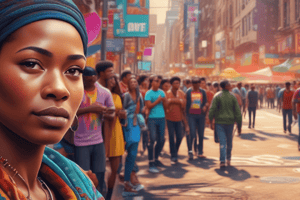Podcast
Questions and Answers
What are the key elements necessary for a social movement to gain momentum and make an impact?
What are the key elements necessary for a social movement to gain momentum and make an impact?
Organization, leadership, and resources
What are the main goals of activist movements and regressive or reactionary movements?
What are the main goals of activist movements and regressive or reactionary movements?
Activist movements focus on changing some aspect of society, while regressive or reactionary movements actively try to resist change.
What was the initial perception of people involved in social movements according to the mass society theory?
What was the initial perception of people involved in social movements according to the mass society theory?
Dysfunctional, irrational, and dangerous
What is the ultimate fate of a successful social movement?
What is the ultimate fate of a successful social movement?
What impact do both successful and failed social movements have on society?
What impact do both successful and failed social movements have on society?
What is an example of a successful social movement mentioned in the text?
What is an example of a successful social movement mentioned in the text?
How does the text suggest that society views past radical social movements?
How does the text suggest that society views past radical social movements?
What is relative deprivation theory focused on?
What is relative deprivation theory focused on?
According to resource mobilization theory, what factors help or hinder social movements?
According to resource mobilization theory, what factors help or hinder social movements?
Why is a charismatic leader considered essential in social movements?
Why is a charismatic leader considered essential in social movements?
Flashcards are hidden until you start studying
Study Notes
- During the 20th century, scholars focused on the psychological need for involvement in social movements, but this perspective changed in the 1960s.
- The civil rights movement and other social movements were not solely driven by the most oppressed groups but by how people perceived their situation.
- Relative deprivation theory focuses on the feeling of discrepancy between legitimate expectations and reality, desire for better conditions, and belief in the futility of conventional methods for change.
- Criticisms of relative deprivation theory include the involvement of people not directly affected and the failure of social movements to form even when all three factors are present.
- Resource mobilization theory emphasizes the practical factors that help or hinder social movements, such as access to resources and a strong organizational base.
- A charismatic leader, like Martin Luther King Jr., is essential for uniting members and gaining support.
- Rational choice theory proposes that individuals make choices based on the pros and cons of different actions.
- Social movements can cause collective behavior, such as panics and crazes, which can impact society.
- Social movements begin with a few shared ideas, progress to public recognition of a problem, and result in either successful change or adaptation.
- Social movements eventually become part of the bureaucracy they were trying to change.
Studying That Suits You
Use AI to generate personalized quizzes and flashcards to suit your learning preferences.




